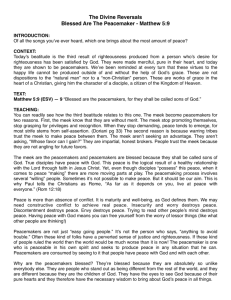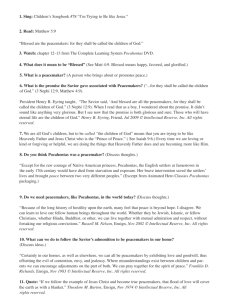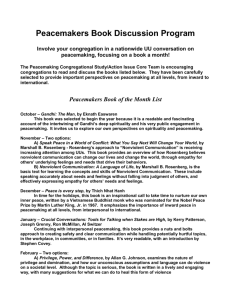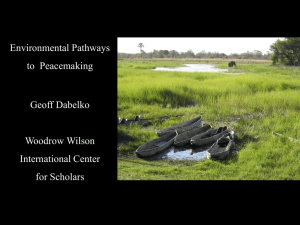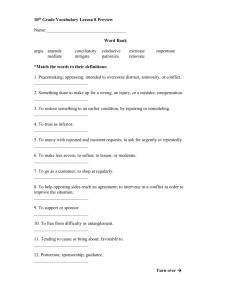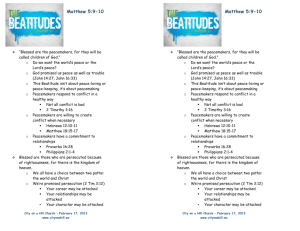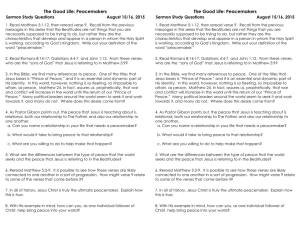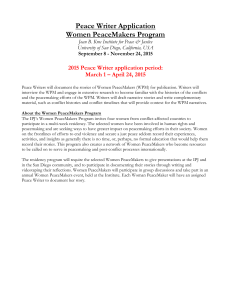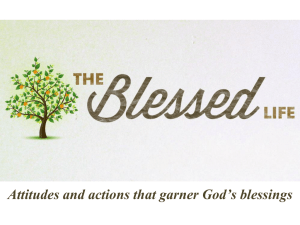Spiritual Disciplines for Ordinary People Chapter 9: Peacemaking
advertisement
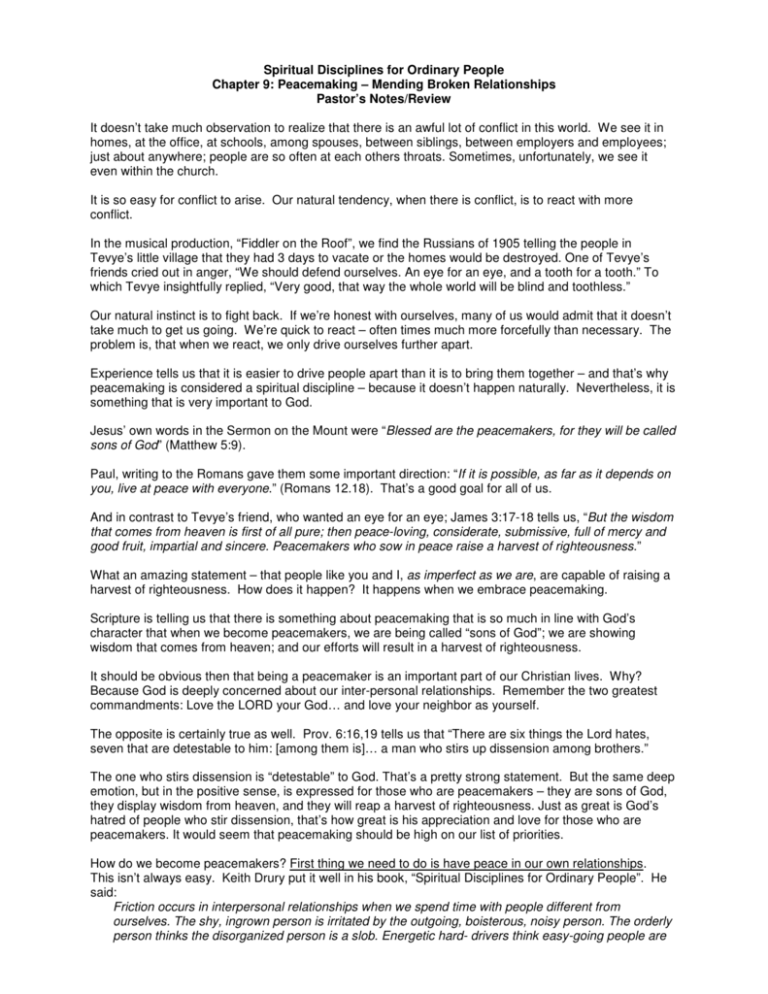
Spiritual Disciplines for Ordinary People Chapter 9: Peacemaking – Mending Broken Relationships Pastor’s Notes/Review It doesn’t take much observation to realize that there is an awful lot of conflict in this world. We see it in homes, at the office, at schools, among spouses, between siblings, between employers and employees; just about anywhere; people are so often at each others throats. Sometimes, unfortunately, we see it even within the church. It is so easy for conflict to arise. Our natural tendency, when there is conflict, is to react with more conflict. In the musical production, “Fiddler on the Roof”, we find the Russians of 1905 telling the people in Tevye’s little village that they had 3 days to vacate or the homes would be destroyed. One of Tevye’s friends cried out in anger, “We should defend ourselves. An eye for an eye, and a tooth for a tooth.” To which Tevye insightfully replied, “Very good, that way the whole world will be blind and toothless.” Our natural instinct is to fight back. If we’re honest with ourselves, many of us would admit that it doesn’t take much to get us going. We’re quick to react – often times much more forcefully than necessary. The problem is, that when we react, we only drive ourselves further apart. Experience tells us that it is easier to drive people apart than it is to bring them together – and that’s why peacemaking is considered a spiritual discipline – because it doesn’t happen naturally. Nevertheless, it is something that is very important to God. Jesus’ own words in the Sermon on the Mount were “Blessed are the peacemakers, for they will be called sons of God” (Matthew 5:9). Paul, writing to the Romans gave them some important direction: “If it is possible, as far as it depends on you, live at peace with everyone.” (Romans 12.18). That’s a good goal for all of us. And in contrast to Tevye’s friend, who wanted an eye for an eye; James 3:17-18 tells us, “But the wisdom that comes from heaven is first of all pure; then peace-loving, considerate, submissive, full of mercy and good fruit, impartial and sincere. Peacemakers who sow in peace raise a harvest of righteousness.” What an amazing statement – that people like you and I, as imperfect as we are, are capable of raising a harvest of righteousness. How does it happen? It happens when we embrace peacemaking. Scripture is telling us that there is something about peacemaking that is so much in line with God’s character that when we become peacemakers, we are being called “sons of God”; we are showing wisdom that comes from heaven; and our efforts will result in a harvest of righteousness. It should be obvious then that being a peacemaker is an important part of our Christian lives. Why? Because God is deeply concerned about our inter-personal relationships. Remember the two greatest commandments: Love the LORD your God… and love your neighbor as yourself. The opposite is certainly true as well. Prov. 6:16,19 tells us that “There are six things the Lord hates, seven that are detestable to him: [among them is]… a man who stirs up dissension among brothers.” The one who stirs dissension is “detestable” to God. That’s a pretty strong statement. But the same deep emotion, but in the positive sense, is expressed for those who are peacemakers – they are sons of God, they display wisdom from heaven, and they will reap a harvest of righteousness. Just as great is God’s hatred of people who stir dissension, that’s how great is his appreciation and love for those who are peacemakers. It would seem that peacemaking should be high on our list of priorities. How do we become peacemakers? First thing we need to do is have peace in our own relationships. This isn’t always easy. Keith Drury put it well in his book, “Spiritual Disciplines for Ordinary People”. He said: Friction occurs in interpersonal relationships when we spend time with people different from ourselves. The shy, ingrown person is irritated by the outgoing, boisterous, noisy person. The orderly person thinks the disorganized person is a slob. Energetic hard- drivers think easy-going people are lazy wimps. The easy-going person returns the assessment, considering the hard-driver a fascist dictator who runs roughshod over everyone who gets in his way. I can tell you there is a lot of truth in that statement. Many times the breakdown of peace is nothing more than a bunch of little annoyances that we allow to fester. I know I’ve got mine: Don’t be late for an appointment, and don’t keep the windows open when the heat is on. Those things kill me. Sometimes I over react – and I need to be careful because like anyone else I can make a big deal out of little things. Of course, not everything is little. Sometimes the disagreements can be over some very major issues. But even then, we need to understand that we can have peace even though we have very different ideas. The key is respect. We don’t need to have 100% agreement in order for there to be peace; we need to have respect for one another. This is especially true in families and in the church. In fact, having peace with someone you disagree with is a sign of maturity. I’m not a psychologist but my guess is that those who argue the most are the ones who are the most insecure – they are so busy trying to convince everyone else of how right they are so they feel better about themselves, but in the process they will often sow dissention. We need to be careful not to sow dissention, but to sow peace. Remember how Jesus made peacemaking a priority even above worship. Jesus said in Matthew 5:23-24 “Therefore, if you are offering your gift at the altar and there remember that your brother has something against you, leave your gift there in front of the altar. First go and be reconciled to your brother; then come and offer your gift.“ Later on, in Matthew 18:15, Jesus says, “If your brother sins against you, go and show him his fault, just between the two of you. If he listens to you, you have won your brother over.” The whole point of all this is that God desires peace and reconciliation between people… because if we want a good relationship with God we need to have good relationships with one another. But peacemaking isn’t just about our own relationships; there is also a place for us, as Christians, to be peacemakers between others who are not getting along. What do we do then? First thing we need to do, as we’ve already covered, is make sure our own relationships are in order. Jesus made the graphic illustration of someone taking a speck out of someone else’s eye while ignoring a plank in his own eye. How can we be peacemakers in other people’s lives when our own lives are in conflict? Second, if after praying about it we feel God prompting us to get involved, then we need to do that. This doesn’t mean we stick our nose into every situation, but when and where it is possible, and particularly when we’ve prayed about a situation, God may want to use you as an instrument of peace in others lives. We remember what Paul wrote to the Ephesians (2:4), “Each of you should look not only to your own interests, but also to the interests of others”. Of course, we have to do this with a great deal of humility and a whole lot of Godly wisdom… but that is our calling – to be peacemakers. 2 Corinthians 5:18 says that God “gave us the ministry of reconciliation”. Take a moment to consider, first of all, what your own relationships are like. Is there peace? Is there anyone you need to reconcile with? And secondly, is it possible that God might use you to be a peacemaker for someone else?


